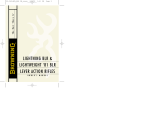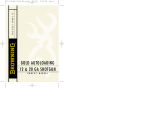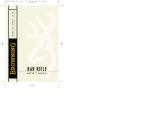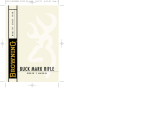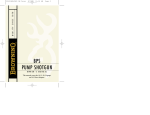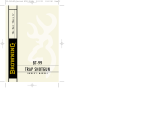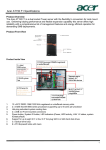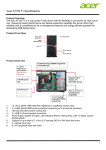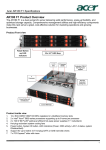Download BOSS® - Browning
Transcript
8/7/03 9:24 AM Page 2 T H E B E S T T H E R E I S ™ 02380-BFA_BOSSOMCOVR BOSS O W N E R ’ S ® M A N U A L 02380-BFA_BOSSOMdoc 8/7/03 9:22 AM Page 1 SWEET SPOT CHARTS FOR YOUR BOSS -EQUIPPED RIFLE ARE AVA I L A B L E AT B R O W N I N G . C O M OR CALL: ® 1-800-333-3288 BOSS ® OWNER’S MANUAL (BALLISTIC OPTIMIZING SHOOTING SYSTEM) Very important: Save this booklet. Carefully read this entire owner’s manual before using your new Browning firearm. New Gun Owner’s Record Keep this record for future reference: Browning Model __________________________________ Serial Number __________________________________ Gauge / Caliber __________________________________ Purchase Price __________________________________ Purchased From __________________________________ Date of Purchase __________________________________ 02380-BFA_BOSSOMdoc 8/7/03 9:22 AM Page 2 YOU ARE RESPONSIBLE FOR FIREARMS SAFETY These are additional instructions specific to the BOSS® installed on your new A-Bolt or BAR rifle. You must read and understand the cautions and proper handling procedures outlined in this booklet and in the owner’s manual received with your rifle before using your new BOSS®-equipped rifle. If you are missing the owner’s manual for your rifle, we will send you a free replacement manual upon request. You can also visit our website at browning.com as many of our owner’s manuals are posted on line. CAUTION: THE THREADING ON YOUR BARREL IS FOR BROWNING BOSS COMPONENTS ONLY. DO NOT INSTALL ANY OTHER DEVICE ONTO THE BROWNING BOSS BARREL. DO NOT INSTALL THE BOSS DEVICE ON ANY RIFLE, WHICH IS NOT DESIGNED AND FITTED FOR THE BOSS BY BROWNING. DOING SO MAY CAUSE SERIOUS INJURY OR DEATH TO YOURSELF OR OTHERS. ® ® ® ® G E N E R A L O P E R AT I O N The BOSS® (Ballistic Optimizing Shooting System) allows you to fine tune accuracy by modifying the vibrations of your rifle’s barrel using an adjustable weight system. Every time a rifle is fired, barrel vibrations are set in motion. These vibrations occur in all directions, even back and forth along the axis of the barrel. Browning research has confirmed that barrel vibrations are the primary cause of inaccuracy. Barrel vibrations are influenced by many factors such as bullet type, bullet weight, primers, different powders and barrel configurations. The BOSS® adjusts timing of barrel vibrations so the bullet consistently leaves the rifle muzzle at the most advantageous time. Once the BOSS® is adjusted to this “Sweet Spot” for a given ammunition, your rifle will consistently deliver extraordinarily tight groups. With precision ammunition, BOSS®-equipped rifles of many calibers are capable of 100 yard, one hole groups. The smallest 3-shot group obtained during the BOSS® development measured an incredible .051" at 100 yards, using factory loaded ammunition. No 2 02380-BFA_BOSSOMdoc FIGURE 1 Micro Adjustable Lockout 8/7/03 9:22 AM Page 3 FIGURE 1A Micro Adjustable Lockout Body Micrometer Adjustment Ring Body Micrometer Adjustment Ring longer will you need to try a variety of ammunition to obtain acceptable accuracy. With the BOSS®, you can tune your rifle to get the optimum accuracy for all available factory loads. When adjusted to its Sweet Spot, the BOSS® will compensate for slight deviations in ammunition velocity. However, the BOSS® will not compensate for poor shooting or flyers caused by low quality bullets and ammunition. TO OBTAIN THE HIGHEST LEVEL OF ACCURACY FROM YOUR RIFLE, IT IS RECOMMENDED THAT THE RIFLE BORE BE CLEANED AFTER EVERY 12 TO 15 ROUNDS. SEE "CLEANING THE RIFLE BORE" SECTION OF THIS BOOKLET FOR CLEANING PROCEDURES. M U Z Z L E B R A K E F E AT U R E The BOSS® is available in two versions, the muzzle break version (Figure 1) and the CR (conventional recoil) version (Figure 1A). WARNING: THE BOSS WITH RECOIL REDUCING MUZZLE BRAKE PROVIDES SUBSTANTIAL INCREASED NOISE/MUZZLE BLAST. ALWAYS WEAR HEARING PROTECTION TO PREVENT HEARING LOSS OR DAMAGE. ® The unique exhaust hole pattern on the BOSS® with muzzle brake provides considerable recoil reduction. Recoil reduction of the BOSS® ranges from 30% to 50% - depending on caliber, weight of rifle, etc. You will experience an increase in noise and concussion (muzzle blast) when a BOSS®-equipped rifle is fired. Hearing protectors (shooting ear plugs or muffs) should always be worn to guard against hearing damage when shooting a BOSS®-equipped rifle. Wear shooting glasses 3 02380-BFA_BOSSOMdoc 8/7/03 9:22 AM Page 4 to protect your eyes from flying particles. Always keep a safe distance between the muzzle of your firearm and any persons nearby, as muzzle blast, debris and ejecting shells could inflict serious injury. BOSS S P E C I F I C AT I O N S ® The BOSS® body length is 2" for all calibers. The size of the gas vent holes and hole pattern is the same for all calibers. The size of the bullet exit hole is the same for all calibers except for the 338 Win. Mag. and 375 H&H. The thread system for the 338 Win. Mag. and the 375 H&H is different from other calibers to rule out the possibility of accidentally switching components and creating an unsafe combination. Do not attempt to interchange these systems. Use only the BOSS intended for use with your rifle. Each BOSS® consists of a micro-adjustable lock nut and body (Figure 1). The body of the BOSS® consists of a weight and muzzle brake. The weight and muzzle brake are affixed by LOCTITE®. The micro-adjustable lock nut has a micrometer adjustment ring. To obtain the utmost accuracy from your BOSS®-equipped rifle, it is very important that the micro-adjustable lock nut and body are always tight. THE “SWEET SPOT” Precision accuracy from the BOSS® system is achieved by calibrating your rifle caliber and ammunition with a prescribed Sweet Spot setting. (The Sweet Spot chart is available separately from this manual. If you do not have a Sweet Spot chart, call 1-800-333-3288 to request one. You can also look up this information at browning.com) This chart lists average, or suggested, Sweet Spots. These settings were determined through extensive testing by the Browning research and development staff. Sweet Spots may vary between rifles of identical specifications with given ammunition. Even one quarter of a turn away from the Sweet Spot can cause a group to spread out as much as one inch or more. We suggest you use our listed Sweet Spot settings as a starting point in determining the exact Sweet Spot setting for your particular rifle and make changes accordingly. NOTE: ANY CHANGE IN THE BOSS SETTING MAY SLIGHTLY ALTER YOUR RIFLE’S POINT OF IMPACT. ® 4 02380-BFA_BOSSOMdoc 8/7/03 FIGURE 2 9:22 AM Page 5 FIGURE 2A Calibrate the BOSS so ”0“ lines up with the hatch mark on the barrel. ® The micro-adjustable lock nut must be bottomed out. It is recommended you set the BOSS® Sweet Spot setting before sighting in your rifle for windage and elevation. The BOSS® was tested in full turn, 1⁄2 and 1⁄4 turn increments. Tighter groups may be achieved with the BOSS® tested in other positions. On the Sweet Spot chart, Sweet Spots are listed by both ammunition and rifle model. Settings not listed, either do not apply or are for ammunition not yet tested. PRELIMINARY ADJUSTMENTS Before setting your Sweet Spot, it is important that your BOSS® be calibrated with the barrel. This will ensure that your rifle is consistent with those tested by Browning research and development when BOSS® Sweet Spots were initially determined. To find out if your BOSS® needs to be recalibrated, loosen the microadjustable lock nut and turn it until it bottoms out on the threads of the BOSS® – or will not loosen any further. If your BOSS® is calibrated, the “0” on the micrometer adjustment ring will line up with the longitudinal hatch mark on the barrel (Figure 2). If the “0” is not aligned with the longitudinal hatch mark, you will need to calibrate your BOSS®. Move the micrometer adjustment ring on the bottom of the micro-adjustable lock nut so the “0” is aligned with the longitudinal hatch mark. To adjust the micrometer adjustment ring, insert your fingernail or a small pointed object in the split of the ring and rotate the ring (Figure 3). 5 02380-BFA_BOSSOMdoc FIGURE 3 Rotate the micrometer adjustment ring 8/7/03 9:22 AM Page 6 FIGURE 4 Full-turn Sweet Spot increments CAUTION: WHEN SETTING THE SWEET SPOT ON YOUR RIFLE, MAKE CERTAIN YOUR RIFLE IS FULLY UNLOADED AND THAT THE RIFLE’S SAFETY IS IN THE "ON SAFE" POSITION AND YOUR RIFLE IS POINTED IN A SAFE DIRECTION. SETTING YOUR RIFLE’S SWEET SPOT Full turn Sweet Spot settings or graduations are numbered 1-10 and inscribed on the barrel of your rifle (Figure 4). Smaller 1⁄10 turn increments are inscribed on the micrometer adjustment ring (Figure 5). To set the Sweet Spot, the micro-adjustable lock nut is turned either clockwise or counterclockwise until it is aligned with the desired Sweet Spot number inscribed on your rifle’s barrel. One full revolution of the micro-adjustable lock nut indicates one full change in setting, or one index mark on the barrel. 1⁄10 turn increments are set by rotating the micro-adjustable lock nut until the desired setting lines up with the hatch mark on the barrel. IMPORTANT: When adjusting the Sweet Spot, make sure you grip the knurled surface of the lock nut. The knurled portion of the microadjustable lock nut and micrometer adjustment ring must rotate together to ensure a precise Sweet Spot setting and retainment of proper calibration. 6 02380-BFA_BOSSOMdoc FIGURE 5 1⁄10 turn Sweet Spot increments 8/7/03 9:22 AM Page 7 FIGURE 6 Example 1: Sweet Spot set at 6.0 EXAMPLE 1 1 Suppose you have a 270 caliber A-Bolt rifle and are sighting in with 150 grain cartridges. Referring to the Sweet Spot chart, you will find the average Sweet Spot to be 6.0 for a 270 A-Bolt with 150 grain ammunition. 2 After having made sure your BOSS® is calibrated properly on the barrel, rotate the micro-adjustable lock nut counterclockwise six full revolutions. The edge of the micrometer adjustment ring should line up, or rest, on the marking for 6.0 on the barrel of the rifle. NOTE: It is not necessary to calibrate your BOSS® with each change in Sweet Spot settings. However, you should check the BOSS® periodically to assure proper alignment. 3 Since the Sweet Spot setting is listed at 6.0, the 0 inscribed on the micrometer adjustment ring should line up with the hatch mark or longitudinal line on the barrel (Figure 6). 4 Tighten the body of the BOSS® so it is secure against the microadjustable lock nut. Use the special wrench supplied with your rifle. Insert the wrench through one end of an exhaust hole and out through another. It is recommended to insert the wrench through the smallest set of holes possible. Turn clockwise until the body and micro-adjustable lock nut are tight (Figure 7). 7 02380-BFA_BOSSOMdoc FIGURE 7 Tighten the BOSS so it is secure 8/7/03 9:22 AM Page 8 FIGURE 8 Example 2: sweet spot set at 2.5 CAUTION: REMOVE THE WRENCH FROM THE BOSS EXHAUST HOLES BEFORE FIRING YOUR RIFLE. FAILURE TO DO SO CAN CAUSE INJURY TO YOURSELF OR OTHERS. ® EXAMPLE 2 1 Suppose you have a 300 Win. Mag. BAR rifle and are using Federal 180 grain cartridges. Referring to the Sweet Spot chart, you will find the average Sweet Spot to be 2.5. 2 Calibrate your BOSS® and rotate the micro-adjustable lock nut counterclockwise until the edge of the micrometer adjustment ring lines up, or rests, on the marking for 2.0 on the barrel. 3 Since the Sweet Spot is listed as 2.5, the 5.0 inscribed on the micrometer adjustment ring should line up with the hatch mark or vertical line on the barrel (Figure 8). 4 Using the special wrench, tighten the body of the BOSS® so it is secure against the lock nut. Your BOSS® system is now calibrated for Federal 180 grain ammunition using a 300 Win. Mag. BAR rifle. MORE PRECISE ADJUSTMENTS If you desire to further experiment and possibly obtain even tighter groupings, turn the micro-adjustable lock nut 1⁄4 of a turn clockwise and fire your rifle at a safe target. If the group opens up (gets larger), turn the micro-adjustable lock nut counterclockwise and sight in at different 1⁄4 turns until you are satisfied with your groupings. Sweet Spot settings may vary between rifles of identical specifications with a 8 02380-BFA_BOSSOMdoc 8/7/03 FIGURE 9 9:22 AM Page 9 FIGURE 10 Barrel Mounting Screw Trigger Guard Screw BAR Forearm Locking Screw given ammunition. As in any sighting-in process, the best results are obtained through trial and error. You may need to retune the BOSS® should you decide to shoot ammunition of different brands, lots and/or types. Be sure to keep a record of your rifle’s Sweet Spots, especially if you use your rifle for different game and shoot different loads. CAUTION: WHEN ADJUSTING THE SWEET SPOT, NEVER SET THE BOSS BEYOND THE 10 SETTING. ® With the BOSS® set beyond 10, it could become loose, misaligned or disengaged when firing the rifle. This could result in serious injury to yourself or others. IMPORTANT: Each time you set the Sweet Spot, the body of the BOSS® must be tight against the micro-adjustable lock nut. Failure to keep the components tightly locked will adversely affect accuracy. NOTE: The barrel mounting screw and trigger guard screw on the ABolt should also be fully tightened (Figure 9). If the barrel mounting screw and trigger guard screw are loose on your A-Bolt, tighten the barrel mounting screw before tightening the trigger guard screw. On the BAR, the forearm locking screw should be kept fully tightened (Figure 10) to obtain, and retain, the best possible accuracy from your BOSS®-equipped rifle. 9 02380-BFA_BOSSOMdoc 8/7/03 9:22 AM Page 10 NYLON LOCKING DEVICE A strip of nylon in the threaded portion of the barrel helps keep the Sweet Spot properly positioned. This locking device keeps the components tight to the barrel, which is essential to optimum accuracy (Figure 11). The nylon may become worn with prolonged use and may require replacement. Replacement nylon locks are available from the Browning parts department located in Arnold, Missouri. CARE OF YOUR BOSS -EQUIPPED RIFLE ® The BOSS® is a precision instrument. IN ORDER FOR THE BOSS TO OPERATE EFFECTIVELY, IT IS VERY IMPORTANT YOUR RIFLE REMAINS IN ITS ORIGINAL PURCHASE CONDITION. IT IS NECESSARY FOR YOUR RIFLE’S BARREL TO REMAIN FREE-FLOATING AND THE ACTION TO BE PROPERLY BEDDED. ® The above statement holds true either for the A-Bolt or BAR. To check for adequate clearance, it is recommended that a piece of paper, folded once, be able to pass between the barrel and stock without any interference. If the barrel is not free-floating, take your rifle to a competent gunsmith or send it to the Browning service facility in Arnold, Missouri. Special rubber bedding in the barrel mounting screw area and magazine well area of your BOSS®-equipped A-Bolt rifle is installed at the factory and aids greatly in improving accuracy. (Rubber bedding is not needed for the BAR.) If you have any modifications made to your stock, make sure the rubber bedding has not been altered. If the rubber bedding on your rifle has been modified, send your rifle to the service facility in Arnold, Missouri. FIGURE 11 Nylon Locking Device 10 02380-BFA_BOSSOMdoc 8/7/03 9:22 AM Page 11 CLEANING THE RIFLE BORE To maintain the utmost accuracy from your BOSS®-equipped rifle, or any rifle, extensive testing has proven that the rifle bore must be cleaned after every 12 to 15 rounds. CAUTION: BEFORE CLEANING YOUR RIFLE, MAKE CERTAIN YOUR RIFLE IS FULLY UNLOADED, THE MAGAZINE IS REMOVED, THE SAFETY IS IN THE "ON SAFE" POSITION AND IT IS POINTED IN A SAFE DIRECTION. ® We highly recommend that your rifle be cleaned with the BOSS installed on your barrel. On the A-Bolt, remove the bolt and clean rifle from the breech end. The BAR, by design, must be cleaned from the muzzle end. Use extra care when cleaning to avoid damaging the muzzle crown. Modern cartridge jackets are made mainly of copper and zinc. These metals glide easily and prolong barrel life; however, residues from copper and zinc stick to the barrel and require more frequent cleaning. As top benchrest shooters have known for decades, copper solvent is the key to cleaning a barrel for optimum accuracy. The recommended cleaning procedure is as follows: 1 Clean the bore with a good powder solvent to remove all traces of powder residue. Performing this step before the application of a copper solvent will prevent the bore from refouling with copper so readily. 2 Swab the bore with a good copper solvent using the manufacturer’s recommended procedures. After neutralizing the solvent, generally with oil, it is important to swab the bore dry to reduce copper buildup. NOTE: DO NOT USE SOLVENTS OF DIFFERENT MANUFACTURERS CONCURRENTLY. A CHEMICAL REACTION MAY RESULT THAT WILL CORRODE EVEN STAINLESS STEEL BARRELS. IT IS IMPORTANT TO FOLLOW THE MANUFACTURER’S RECOMMENDATIONS EXACTLY. 3 If necessary, the BOSS® may be removed to facilitate cleaning your rifle. 11 02380-BFA_BOSSOMdoc 8/7/03 9:22 AM Page 12 NOTE: WHEN CLEANING THE BAR WITH THE BOSS REMOVED, THE PLASTIC CAP (CROWN AND ACCURACY PRESERVER) PROVIDED WITH THE RIFLE SHOULD ALWAYS BE USED TO PROTECT THE MUZZLE’S CROWN. ALWAYS MAKE SURE THE CAP USED MATCHES THE CALIBER OF THE RIFLE BEING CLEANED. THE CALIBER IS MARKED ON THE END OF THE CAP. ® Clean the BOSS® by unscrewing the body and micro-adjustable lock nut from the rifle. With the components disassembled, wipe each component with oil. Browning oil is excellent for this application. Lightly oil all threads and make sure the exhaust holes are free of obstructions. REMEMBER TO REMOVE THE PLASTIC CAP WHEN REASSEMBLING THE BOSS ON THE BAR. 4 Reassemble your BOSS® by screwing on the micro-adjustable lock nut and then the BOSS® body. After taking apart the BOSS®, it will be necessary to reset the Sweet Spot. ® MAKE CERTAIN ALL CLEANING PATCHES ARE REMOVED FROM THE BARREL AND EXHAUST HOLES IN THE BODY OF THE BOSS BEFORE FIRING YOUR RIFLE. ® 5 After cleaning the bore, it is recommended two fouling shots be fired when firing for extreme accuracy. Additionally, it is recommended the rifle be allowed to cool every three rounds. 12 You Are Responsible For Firearms Safety As a gun owner, you accept a set of demanding responsibilities. How seriously you take these responsibilities can mean the difference between life and death. Failure to follow any of these instructions can cause extensive damage to your gun and/or possible serious injury or death to yourself and others. There is no excuse for careless or abusive handling of any firearm. At all times handle any firearm with intense respect for its power and potential danger. PLEASE READ AND UNDERSTAND ALL OF THE CAUTIONS, PROPER HANDLING PROCEDURES AND INSTRUCTIONS OUTLINED IN THE OWNER’S MANUAL BEFORE USING YOUR NEW FIREARM. 1. ALWAYS KEEP THE MUZZLE OF YOUR RIFLE POINTED IN A SAFE DIRECTION, even though you are certain that the rifle is unloaded. Never point any firearm at anything you do not intend to shoot. Be extremely alert and aware of all persons and property within the range of your ammunition. 2. NEVER RELY TOTALLY ON YOUR RIFLE'S MECHANICAL "SAFETY" DEVICE. The word "safety" describes a gun's trigger block mechanism, sear block mechanism, hammer block mechanism or firing pin block mechanism. These mechanical devices are designed to place your gun in a SAFER status. No guarantee can be made that the gun will not fire even if the "safety" is in the "on safe" position. See "Operations of the Safety" for instructions on operation of YOUR gun's "safety." LIKE ANY MECHANICAL DEVICE, A "SAFETY" CAN SOMETIMES FAIL; IT CAN BE JARRED OR INADVERTENTLY MANIPULATED INTO AN UNSAFE CONDITION. Mechanical "safeties" merely aid safe gun handling and are no excuse for pointing your rifle's muzzle in an unsafe direction. While it is a good idea to "test" your rifle's mechanical "safeties" periodically for proper function, NEVER TEST IT WHILE YOUR RIFLE IS LOADED OR POINTED IN AN UNSAFE DIRECTION Safe gun handling does not stop with your gun's mechanical "safety devices -- it starts there. Always treat your rifle with the respect due a loaded, ready-to-fire firearm. 3. WHENEVER YOU HANDLE A FIREARM, OR HAND IT TO SOMEONE, ALWAYS OPEN THE ACTION IMMEDIATELY, VISUALLY CHECK YOUR RIFLE'S CHAMBER, FEED MECHANISM AND MAGAZINE. Make certain they do not inadvertently contain any ammunition. Always keep the chamber empty and "safety" in the "on safe" position unless shooting is imminent. 4. DO NOT TRANSPORT YOUR RIFLE LOADED, WHETHER IN A SCABBARD, GUN CASE, OR OTHER CONTAINER. 5. HUNTING FROM ELEVATED SURFACES SUCH AS TREE STANDS IS DANGEROUS, and may increase the risk of handling a firearm. The following rules should always be observed by you and those you hunt with: Always make certain that the stand being used is safe and stable. Always make certain that your firearm is unloaded when it is being taken up to and down from the stand. Always make certain that your firearm is not dropped from the stand, or dropped while it is being taken up to or down from the stand. Remember, a loaded firearm may discharge when dropped, even with the safety in the "on safe" position. 6. BEWARE OF BARREL OBSTRUCTIONS, for the safety of both your gun and yourself. Mud, snow, and an infinite variety of other obstructions may inadvertently lodge in a barrel bore. It takes only one small obstruction to cause dangerously increased pressures that can ruin (swell or rupture) the finest rifle barrels. BEFORE CHECKING FOR A BARREL OBSTRUCTION, BE CERTAIN NO LIVE ROUND IS IN THE CHAMBER AND THAT THE MAGAZINE IS REMOVED AND FEED MECHANISMS ARE COMPLETELY EMPTY. PLACE THE "SAFETY" IN THE "ON SAFE" POSITION. Look through the barrel to be sure it is clear of any obstruction. If an obstruction is seen, no matter how small it may be, clean the bore with a cleaning rod and patch as described in "Cleaning and Maintenance Suggestions." Before the first firing, clean the bore with a cleaning rod and patch, and wipe away any anti-rust compound in the action/chamber areas. 7. ALWAYS UNLOAD YOUR RIFLE WHEN NOT IN USE. REFER TO "UNLOADING THE RIFLE" FOR AN EXPLANATION OF HOW TO UNLOAD YOUR RIFLE PROPERLY. As a safety precaution, it is preferable to disassemble your gun for storage. Store your gun and ammunition separately -- well beyond the reach of children. Take all safeguards to ensure your rifle does not become available to untrained, inexperienced or unwelcome hands. 8. USE THE PROPER AMMUNITION. The barrel and action of this rifle have been made with substantial safety margins over the pressures developed by established American commercial loads. Nevertheless, Browning assumes no liability for incidents which occur through the use of cartridges of nonstandard dimensions which develop pressures in excess of commercially available ammunition with standards established by the Sporting Arms and Ammunitions Manufacturers' Institute (SAAMI). BE ALERT TO THE SIGNS OF AMMUNITION MALFUNCTION. If you detect an off sound or light recoil when a cartridge s fired, DO NOT LOAD ANOTHER CARTRIDGE INTO THE CHAMBER. Open the action and remove all cartridges from the magazine, chamber and action areas. With the action open, glance down the barrel to make sure that an obstruction does not remain in the barrel. If there is an obstruction, completely clear the barrel before loading and firing again. Failure to follow these instructions can cause extensive damage to your gun and possible serious injury to yourself and others. MAKE SURE OF ADEQUATE VENTILATION IN THE AREA THAT YOU DISCHARGE A FIREARM. WASH HANDS THOROUGHLY AFTER EXPOSURE TO AMMUNITION OR CLEANING A FIREARM. Lead exposure can be obtained from discharging firearms in poorly ventilated areas, cleaning firearms or handling ammunition. Lead is a substance that has been known to cause birth defects, reproductive harm and other serious injury. 9. DO NOT SNAP THE FIRING PIN ON AN EMPTY CHAMBER -- THE CHAMBER MAY NOT BE EMPTY! Treat every gun with the respect due a loaded gun, even though you are certain the gun is unloaded. 10. KEEP FINGERS AWAY FROM THE TRIGGER WHILE UNLOADING, LOADING, UNTIL YOU ARE READY TO SHOOT. 11. BE SURE OF YOUR TARGET AND BACKSTOP. Particularly during low light periods. Know the range of your ammunition. Never shoot at water or hard object. 12. ALWAYS UNLOAD YOUR RIFLE'S CHAMBER BEFORE CROSSING A FENCE, CLIMBING A TREE, JUMPING A DITCH OR NEGOTIATING OTHER OBSTACLES. Refer to "Unloading The Rifle" for instructions on the unloading of your rifle. Never place your loaded rifle on or against a fence, tree, car or other similar object. 13. WEAR EYE AND EAR PROTECTION WHEN SHOOTING. Unprotected, repeated exposure to gunfire can cause hearing damage. Wear ear protectors (shooting ear plugs or muffs) to guard against such damage. Wear shooting glasses to protect your eyes from flying particles. Allow proper distance (eye relief) between the scope and your eye when firing a scoped rifle or shotgun. Always keep a safe distance between the muzzle of your firearm and any persons nearby, as muzzle blast, debris and ejecting shells could inflict serious injury. Also, wear eye protection when disassembling and cleaning your shotgun to prevent the possibility of springs, spring-tensioned parts, solvent or other agents from contacting your eyes. 14. DROPPING A LOADED GUN CAN CAUSE AN ACCIDENTAL DISCHARGE even with the "safety" in the "on safe" position. Be extremely careful while hunting or during any shooting activity, to avoid dropping any firearm. 15. IF YOUR RIFLE FAILS TO FIRE, KEEP THE MUZZLE POINTED IN A SAFE DIRECTION. Hold this position for a minimum of 30 seconds. Carefully open the action and remove the cartridge. If the primer is indented, the cartridge should be disposed of in a way that cannot cause harm. If the primer is not indented, your firearm should be examined by a qualified gunsmith and the cause of the malfunction should be corrected before further use. 16. BE DEFENSIVE AND ON GUARD AGAINST UNSAFE GUN HANDLING AROUND YOU AND OTHERS. Don't be timid when it comes to gun safety. If you observe other shooters violating any of these safety precautions, politely suggest safer handling practices. 17. BE CERTAIN YOUR RIFLE IS UNLOADED BEFORE CLEANING. Because so many gun accidents occur when a firearm is being cleaned, special and extreme care should be taken to be sure your gun is unloaded before disassembly, cleaning and reassembly. Keep ammunition away from the cleaning location. Never test the mechanical function of any firearm with live ammunition. 18. TEACH AND SUPERVISE FIREARMS SAFETY TO ALL MEMBERS OF YOUR FAMILY -ESPECIALLY TO CHILDREN AND NONSHOOTERS. Closely supervise newcomers to the shooting sports. Encourage enrolling in hunting/shooting safety courses. 19. NEVER DRINK ALCOHOLIC BEVERAGES OR TAKE ANY TYPE OF DRUGS BEFORE OR DURING SHOOTING. Your vision and judgment could be dangerously impaired, making your gun handling unsafe to you and to others. 20. READ AND HEED ALL WARNINGS in this instruction book, on ammunition boxes and with all accessories that you install on your firearm. It is your responsibility to secure the most up-to-date information on the safe handling procedures of your Browning gun. Browning assumes no liability for incidents which occur when unsafe or improper gun accessories or ammunition combinations are used. 21. PERIODIC MAINTENANCE -- AVOID UNAUTHORIZED SERVICING. Your rifle is a mechanical device which will not last forever, and as such, is subject to wear and requires periodic inspection, adjustment and service. Browning firearms should be serviced by a Browning Recommended Service Center or by Browning's service facility in Arnold, Missouri. Browning cannot assume any responsibility for injuries suffered or caused by unauthorized servicing, alterations or modifications of Browning firearms. 22. BROWNING RESERVES THE RIGHT TO REFUSE SERVICE ON FIREARMS THAT HAVE BEEN ALTERED, ADDED TO OR SUBSTANTIALLY CHANGED. Removal of metal from barrel(s), or modification of the firing mechanism and/or operating parts may lead to Browning's refusal of service on such firearms. Browning will charge the owner parts and labor to return the firearm to original Browning specifications. DO NOT, UNDER ANY CIRCUMSTANCES, ALTER THE TRIGGER, SAFETY OR PARTS OF THE FIRING MECHANISM OF THIS OR ANY OTHER FIREARM. FAILURE TO OBEY THIS WARNING MAY RESULT IN INJURY OR DEATH TO YOURSELF OR OTHERS. BE CAREFUL! 02380-BFA_BOSSOMCOVR 8/7/03 9:24 AM Page 3 SERVICE OR REPAIR If your firearm should require service or repair, we suggest you first contact a local recommended Browning Firearms Service Center. Contact your Browning sporting goods dealer or call our service department for the address of the Service Center nearest you. Alternatively, you may send your firearm directly to our own service department. For technical questions about your firearm, call our service department. Browning Firearms Service Department One Browning Place Arnold, Missouri 63010-9406 800-322-4626 Canadian customers call or write: Browning Canada Sports Ltd./Ltee 5583 Chemin St-François St-Laurent, Quebec H4S 1W6 514-333-7261 02380-BFA_BOSSOMCOVR 8/7/03 9:24 AM Page 4 SWEET SPOT CHARTS FOR YOUR B O S S - E Q U I P P E D R I F L E A R E AVA I L A B L E AT B R O W N I N G . C O M O R C A L L ® 1-800-333-3288 02380-BFA_BOSSOMCOVR 8/7/03 9:24 AM Page 1 WWW.BROWNING.COM BROWNING US: Morgan, Utah 84050-9326 BROWNING CANADA: Browning Canada Sports Ltd/Ltee,St-Laurent, Quebec, H4S 1W6 BROWNING INTL: Parc Industriel des Hauts-Sarts, B-4040 Herstal, Belgium AO0302/ 02380




















